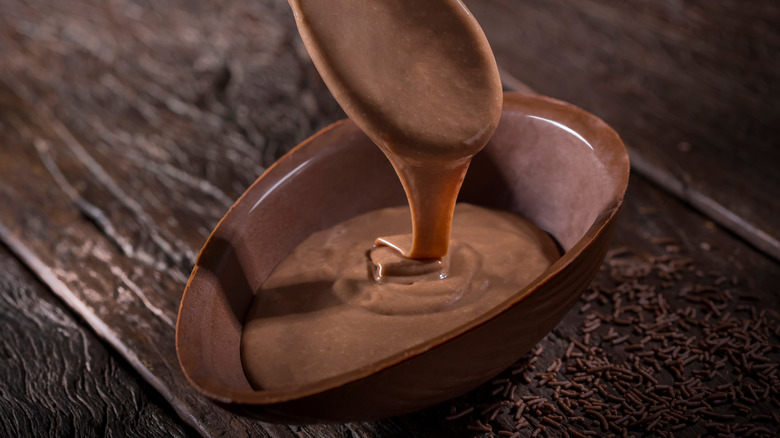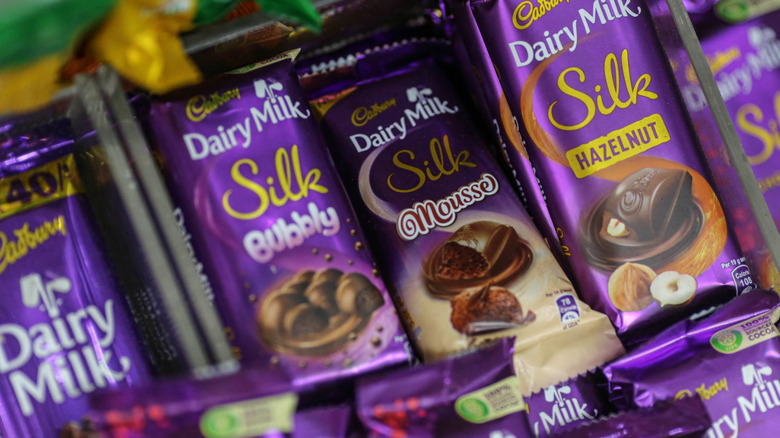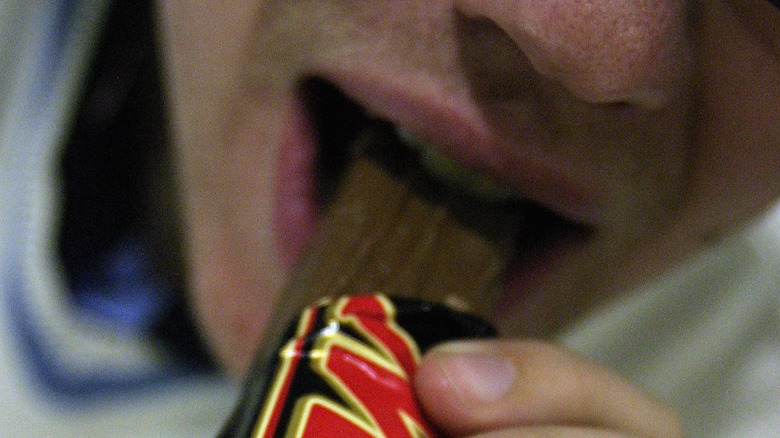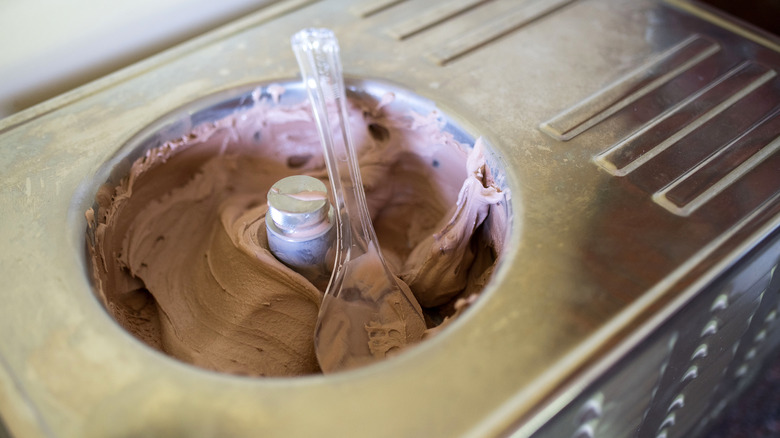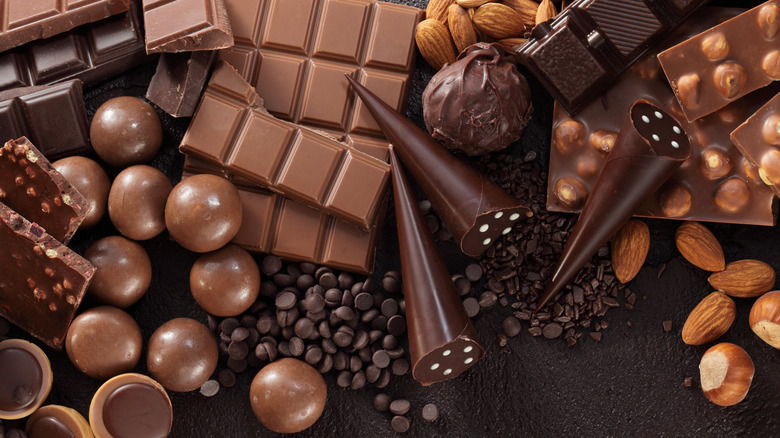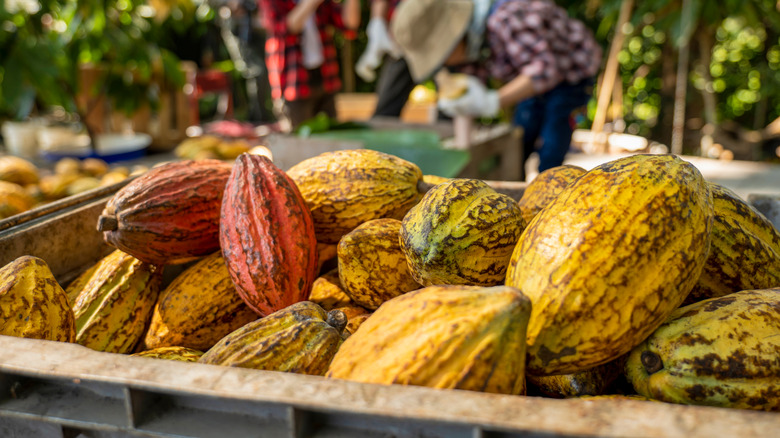The Untold Truth Of World Chocolate Day
As the Fourth of July has just passed, you would be forgiven if, flooded with various grilled food advertisements, you dropped any other food-focused days from your consideration. Forgiven or not, however, your notice (or lack of it) does not change the fact that July 7 was celebrated as World Chocolate Day.
For some, a food day for chocolate may seem strange. With Valentine's Day, Halloween, and Christmas, chocolate already enjoys the spotlight for holidays spread throughout the year. Moreover, it's debatable whether people really need a reason to indulge in chocolate. According to Statista, the worldwide chocolate market is worth $208 billion.
Still, someone somewhere has evidently deemed it necessary to introduce a day of celebration for the most beloved sweet. So, prepare yourselves, for we shall proceed to take World Chocolate Day with the same seriousness that a toddler, returned from their All Hallows Eve raid of the neighborhood, devotes to protecting their stash of Hershey's, Kit Kats, and Reese's.
There's a certain level of mystery around the celebration
Lots of holidays are celebrated on their date because they are celebrated on their date. Yes, there was probably a reason at one point, but over time it disappeared into the mystique.
This is true of food celebration days like World Chocolate Day. If you attempt to find out anything about it, you end up reading, reading, and reading a lot of pieces that sound like National Today's description: "Established in 2009, World Chocolate Day marks the supposed anniversary of the day that this iconic treat made its first entrance into Europe in 1550."
No one ever says who established it or thoroughly sources the supposed date. Wired comes closest to doing so in a 2010 piece, but still contents itself with saying that July 7, 1550 is the date to which the introduction is "often traced" and adds a side note commenting on how this date has developed into a Chocolate Day. Nearly anything you read about World Chocolate Day will include these "facts."
World Chocolate Day is not the true chocolate holiday
Despite the grand title, World Chocolate Day is neither the only nor the first day dedicated to chocolate. There is, for example, National Chocolate Day which, according to Insider, is celebrated in the United States on November 29.
More notably, however, Ghana, which World Atlas credits as the second-largest cocoa producing country in the world, has celebrated their crop on February 14 since 2005, with their own National Chocolate Day Celebration. This makes sense, as it forms an important part of Ghana's economy, and Valentine's Da is a major chocolate holiday.
However, it should be noted that a darker undertone emerges when Barbara Oteng-Gyas, Ghana's Minister of Tourism, Arts and Culture, extolled the importance of the day in a 2020 speech covered by Voyages Afriq: "The National Chocolate Day is in its 15th year; we celebrate the gains so far and look forward to increase awareness of the positive effects of the consumption of chocolate and also minimize social vices associated with the celebration of Valentine's Day." The nature of these vices was not illuminated.
Anyone can create World Chocolate Day
Obviously, World Chocolate Day is a marketing ploy to get you to buy chocolate and not some deep reflection on humanity's connection to confection. It's a disappointing conclusion, but not an unexpected one.
However, Entity Magazine writes, this means that anyone can declare any day as World Chocolate Day as there are already multiple chocolate days in existence anyway. The person most responsible for food days, they note, is not a PR agency or a corporation, but John-Bryan Hopkins, creator of Tater Tot Daily and Foodimentary.com. He alone created hundreds of food days by filling up the calendar for his content that proved so pervasive that even without official recognition, they have been accepted as the basis for the food day calendar cycle anyway.
So while World Chocolate Day has an observed date, it could just as easily be the day that you place chocolate at the center of your world. Of course, the chocolate company or PR agency behind World Chocolate Day would probably be just as happy if you bought more chocolate regardless of which day you celebrate.
Cadbury 3D printed chocolate
Of course, having a broadly recognized date is good for companies, in that it gives them a spotlighted day to capitalize on the efforts of their marketing team.
Cadbury did just that in 2019 when they decided to debut the world's first 3D printer for Cadbury milk chocolate. As news.com.au explained, the device (perhaps to no one's surprise) functioned as a 3D printer, but utilized layers of chocolate to create shapes. The stunt lasted a day and Cadbury has done little to nothing with the technology since. However, as Business Live reported in 2020, Cadbury and 3P Innovations, the company that designed the chocolate 3D printer, teamed up once again to produce medical visors during the onset of the pandemic. So while the ploy may have been a passing, somewhat inane marketing stunt, some actual good has come from Cadbury's activity to dominate the free advertising space afforded by World Chocolate Day.
It gives others a platform as well
The focus on the chocolate industry that World Chocolate Day invites goes beyond simple marketing. It allows for a reflection on industry practices in general. In that vein, Fair World Project, a fair trade watchdog organization, used this year's World Chocolate Day to announce the new season of their podcast series "For A Better World."
Yahoo! Finance writes that the season, titled "Nestlé's KitKat Unwrapped," will investigate the labor conditions in which the harvesters of cocoa work. This is important, the piece goes on to note, because of the recent Supreme Court case Cargill, Inc. v. Doe I, in which Nestlé was allowed to deny responsibility for the trafficking of children and subsequent use as child slaves.
So, when you do go for one of the millions of chocolate recipes shared on World Chocolate Day, enjoy it with a chocolate that has been certified as fair trade. That way, everyone involved in the flavorful brown bar wins.
